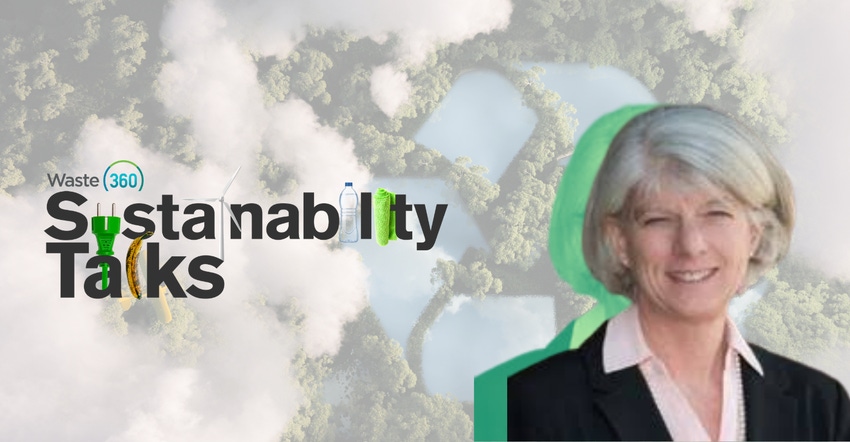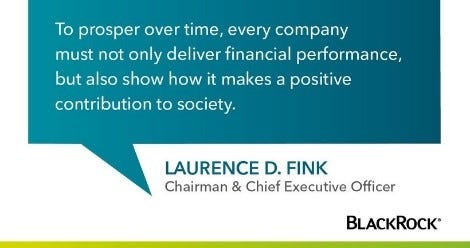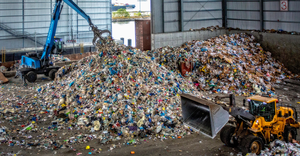Sustainability: Let’s Think Big

It stands to reason that the concept and pursuit of sustainability should endure the stresses and tests of time. Sustainability should, in a word, be sustainable – able to withstand the inevitable societal shockwaves, environmental crises and economic cycles.
Those of us working in the waste and recycling industry have witnessed the evolution. Early on, and even today, our view of sustainability focused primarily on environmental stewardship. From there, the conversation generally moves quickly to recycling. No matter what we do in the communities in which we live and work, sustainability always seems to land on recycling.
There is so much more to it! Over the past decade our focus on sustainability as another word for environment has given way to a much broader framework. This once vaguely defined term has evolved into a far-reaching set of expectations that spans all that we do. Companies are now expected to establish sustainability goals that encompass a suite of “ESG principles.”
And tumultuous 2020 reminds of the imperative to be responsible, responsive corporate citizens and community allies.
What is ESG and Why Does it Matter?
McKinsey’s Definition of ESG
The E in ESG, environmental criteria, includes the energy your company takes in and the waste it discharges, the resources it needs, and the consequences for living beings as a result. Not least, E encompasses carbon emissions and climate change. Every company uses energy and resources; every company affects, and is affected by, the environment.
S, social criteria, addresses the relationships your company has and the reputation it fosters with people and institutions in the communities where you do business. S includes labor relations and diversity and inclusion. Every company operates within a broader, diverse society.
G, governance, is the internal system of practices, controls, and procedures your company adopts in order to govern itself, make effective decisions, comply with the law, and meet the needs of external stakeholders. Every company, which is itself a legal creation, requires governance.
Environmental. Social. Governance = ESG
ESG offers a foundation for navigating the risks and opportunities presented by our increasingly complex world:
“E” - Environment. When making business decisions, potential investors and customers look at the ability of companies to reduce their greenhouse gas (GHG) emissions, and to mitigate the cost impacts of climate change. Companies are increasingly asked what we are doing to not only reduce our impact on the environment, but also to make it better. In our industry, environmental compliance - like safety - is table stakes. Our customers and investors expect us to comply with environmental regulations. But they also expect us to make investments in technologies that will mitigate climate change, reduce GHG emissions, and help customers reduce their emissions, as well.
“S” - Social. Our industry operates in every community in the U.S., managing discards on behalf of our customers. We are a diverse industry operating in diverse communities. The facilities associated with our operations are not always popular, but they are essential for the health and safety of all communities. We contribute to the well-being of local communities by employing local residents and contributing to community and economic vitality.
What social criteria do we need to consider in our industry:
Are we good employers? Are we treating our employees fairly, and do we have the right programs in place to ensure commitments to inclusion and diversity within our companies and as part of our greater communities?
In an industry that often has complicated relationships with the communities in which we work, do we protect and reflect the faces of our communities? Are we good community partners? Are we listening to and learning from those we serve?
We are being asked to address these questions and to do our part to help create and support thriving communities.
“G” - Governance. What about our internal leadership and the processes and procedures our companies use in our own operations? Our stakeholders look to our leaders, our corporate structure and culture, and the processes our companies have thoughtfully established. An equitable governance foundation based on transparent policies benefits all stakeholders. And the current spotlight on racial and gender diversity is prompting a legitimate call for greater diversity in the makeup of corporate boards and executive leadership, as well as inclusive hiring, recruiting and development practices.
Companies of all types are increasingly being held accountable for each of these expectations. Most publicly held companies report on various aspects of their sustainability programs through required financial reports or separate sustainability reports. Investors scrutinize these reports carefully, and an entire industry has developed to rate the ESG performance of companies.
Privately held companies, and even governmental agencies, are closely scrutinized. We all have stakeholders; employees, customers, suppliers, communities and shareholders who demand detailed, verifiable information to decide whether or not to entrust us with their business.
What’s needed? And what’s next?
Public interest in sustainability continues to grow – and heightened interest and expectations push us to do more and do better.
The events of 2020 have drawn attention to both the “S” and “G” of ESG. What are our companies and our industry doing to address social justice? What are the near- and long-term impacts of COVID-19 to our frontline, essential service providers? How do we equitably provide for the needs of an expanding population, while protecting the resources that sustain us?
The connections between E, S and G are apparent throughout our industry, offering opportunities to engage with stakeholders as we seek to make a positive difference within our companies and communities.
Challenges abound. But here’s the good news: ESG matters. It is meaningful, valued and making a substantive difference, even during these complicated times. A recent study by the National Bureau of Economic Research found that even in the midst of current health and financial crises, investors retained their focus on sustainability, indicating that they view sustainability as a necessity, not a luxury.
Why does it matter?
In August of 2019, The Business Roundtable (BR), an organization made up of almost 200 corporate CEOs, adopted a new Statement on the Purpose of the Corporation. For 40 years, the BR endorsed principles of shareholder primacy – that corporations exist principally to serve shareholders. However, BR’s 2019 announcement outlined a new standard for corporate responsibility, committing CEOs to lead their companies for the benefit of all stakeholders – customers, employees, suppliers, communities and shareholders.
“Our investment conviction is that sustainability - and climate-integrated portfolios - can provide better risk-adjusted returns to investors. And with the impact of sustainability on investment returns increasing, we believe that sustainable investing is the strongest foundation for client portfolios going forward.”
Larry Fink, Letter to CEOs, 2020
One investor who has driven the changing attitude of the role of corporations as part of the broader society is Larry Fink, CEO of BlackRock Investment group. Earlier this year, in his annual letter to customers, other CEOs and stakeholders, Fink clearly called out the need for companies to take action. Importantly, he also highlighted the relationship between sustainability commitments and long-term financial success:
Embracing ESG: Three Powerful Letters
As the topics of climate change, racial unrest and social discord take center stage alongside COVID-19, companies can no longer stand on the sidelines.
Fortunately, recent studies suggest companies with higher ESG scores tend to outperform peers (Oppenheimer Equity Research 6.2.2020). This simply makes sense. Companies that are well run – from top to bottom – do better (G). Taking care of employees fosters loyalty and a commitment to success. Community partnerships create mutually supportive investments in future success (S). And caring for the environment mitigates risks and costs associated with climate change (E).
 When we talk about sustainability, let’s think big. Let’s embrace our role as change-makers, taking on the responsibility to help make our world a better place. Through environmentally sound operations. Through thoughtful social interactions. And through strong, principled corporate leadership. E. S. G. Three powerful letters that are rewriting how we live, work and interact.
When we talk about sustainability, let’s think big. Let’s embrace our role as change-makers, taking on the responsibility to help make our world a better place. Through environmentally sound operations. Through thoughtful social interactions. And through strong, principled corporate leadership. E. S. G. Three powerful letters that are rewriting how we live, work and interact.
Our world is changing and it’s time for us to change with it, incorporating ESG into all that we are.
About the Author(s)
You May Also Like


